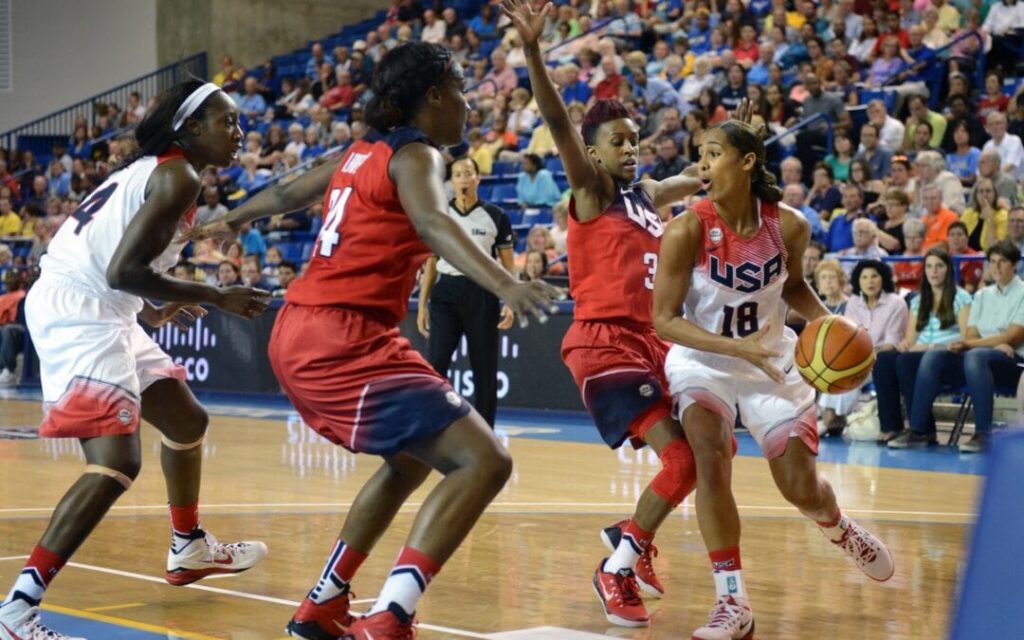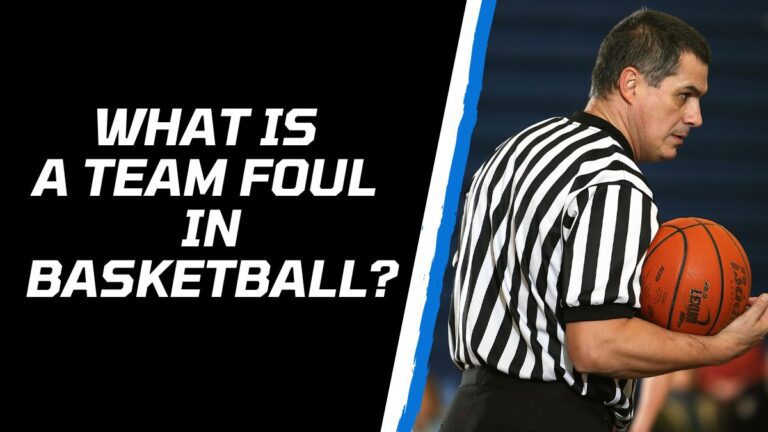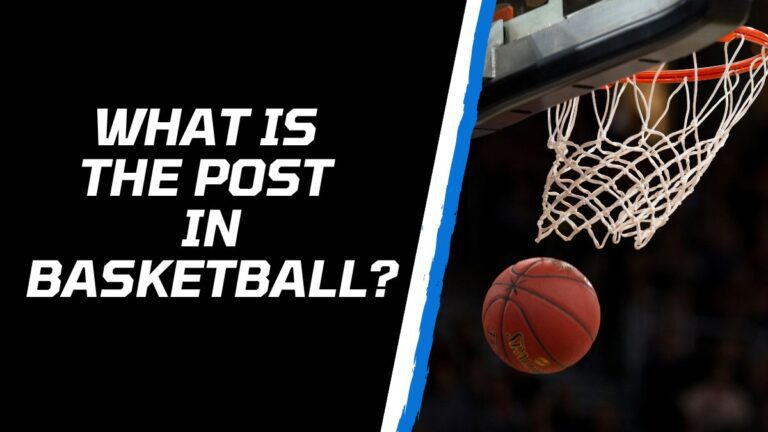What is an Assist in Basketball? – All You Need to Know
In the thrilling world of basketball, teamwork plays a vital role in achieving victory. One essential aspect of teamwork is the “assist.” But what exactly is an assist in basketball? In this blog post, we’ll break down this fundamental concept and its significance in creating unforgettable moments on the court.
We’ll also look at the criteria for an assist along with some common misconceptions. For the basketball players out there, we will also talk about tips for getting more assists. So, let’s get started.
What is an assist in basketball?

An assist in basketball is a pass by a player that leads directly to a score by a teammate. Assists are an important statistic in basketball, as they measure a player’s ability to create scoring opportunities for their teammates.
The exact definition of an assist can vary slightly from league to league, but in general, an assist is awarded when a player makes a pass to a teammate who then takes no more than two dribbles before scoring a field goal. The pass must also be the “last” pass before the basket is scored, meaning that any other passes that were made before the assist do not count.
Why are assists important in basketball?
Assists are important in basketball for a number of reasons. First, they help to measure a player’s ability to create scoring opportunities for their teammates. Players who are good at passing can help their teams score more points, and they can also help their teammates get into a rhythm and make more shots.
Second, assists can help to break down a defense. When a player makes a good pass, it can force the defense to rotate and scramble, which can create open shots for other players.
Moreover, assists can help to build team chemistry. When players are making passes to each other and helping each other score, it can create a sense of camaraderie and trust on the court. This is why assists are highly respected in the basketball world.
How is an assist defined in basketball?
The definition of an assist in basketball can vary slightly from league to league, but in general, an assist is awarded when a player makes a pass to a teammate who then takes no more than two dribbles before scoring a field goal. The pass must also be the “last” pass before the basket is scored, meaning that any other passes that were made before the assist do not count.
In the NBA, a player can also be credited with an assist if their pass leads to a shooting foul and the fouled player makes one or more free throws. However, in FIBA play, a pass that leads to a shooting foul does not count as an assist unless the fouled player makes all of their free throws.
The Criteria For an Assist in Basketball
The definition of an assist in basketball is a subjective one, meaning that it is up to the scorekeepers to decide whether a pass fits the criteria for an assist. However, there are some general guidelines that scorekeepers use when determining whether to award an assist.
First, the pass must be the “last” pass before the basket is scored. This means that any other passes that were made before the assist do not count.
In addition, the pass must lead directly to the basket. This means that the pass must be made to a player who is in a position to score, and the player must take no more than two dribbles before scoring.
Finally, the pass must be made with the intent to create a scoring opportunity. This means that the pass cannot be made simply to get rid of the ball.
If a pass meets all of these criteria, it will be awarded as an assist. However, there are some cases where the definition of an assist can be more subjective. For example, if a player makes a pass to a teammate who then takes a blocked shot, the scorekeepers may decide not to award an assist if they believe that the shot would have been made if it had not been blocked.
Ultimately, the definition of an assist is up to the scorekeepers to decide. However, the general guidelines that I have outlined above should give you a good understanding of what constitutes an assist in basketball.
Common misconceptions about assists
There are a few common misconceptions about assists in basketball. Here are a few of the most common ones:
- Misconception: An assist is only awarded if the player who receives the pass makes a field goal.
Fact: An assist can also be awarded if the player who receives the pass makes a free throw, as long as the pass was made with the intent to create a scoring opportunity. - Misconception: A player cannot get an assist if the shot they made was assisted by another player.
Fact: A player can get an assist even if the shot they made was assisted by another player. In fact, it is possible for a player to get an assist on a shot that was assisted by two or more players. - Misconception: A player cannot get an assist if they make a pass to a teammate who then takes a shot and is fouled.
Fact: A player can get an assist if they make a pass to a teammate who then takes a shot and is fouled, as long as the fouled player makes one or more free throws.
These are just a few of the most common misconceptions about assists in basketball. It is important to understand these misconceptions so that you can accurately track and evaluate a player’s passing ability.
The impact of assists on a team’s offense

The impact of assists on a team’s offense can be significant. Studies have shown that teams that average more assists per game tend to score more points and win more games. For example, a study by the NBA found that teams that averaged 20 assists per game scored an average of 110 points per game, while teams that averaged 15 assists per game scored an average of 100 points per game.
There are a few reasons why assists can have such a big impact on a team’s offense. First, assists help to create open shots. When a player makes a good pass, it can put their teammate in a position to take a high-percentage shot.
Second, assists help to spread the ball around. When a team is able to get its players involved in the offense, it can make it more difficult for the defense to focus on any one player.
Third, assists help to create momentum. When a team is able to string together a few assists, it can get the crowd excited and give the team a sense of momentum. Therefore, due to these reasons, there seems to be a big impact of assists on a team’s offense.
The role of assists in a player’s overall value
Assists are an important part of a player’s overall value in basketball. Players who are good at passing can help their teams score more points, and they can also help their teammates get into a rhythm and make more shots.
In addition, assists can help to improve a player’s reputation. Players who are known for their passing ability are often seen as being more valuable to their teams.
Of course, assists are not the only factor that determines a player’s overall value. Other factors, such as scoring, rebounding, and defense, are also important. However, assists can be a significant part of a player’s overall value, and they should not be overlooked.
Tips for getting more assists

Here are some tips that can help you get more assists in a basketball game:
- Be aware of your teammates’ positions. One of the most important things you can do to get more assists is to be aware of where your teammates are on the court. This means knowing where they are at all times, and it also means knowing what their strengths and weaknesses are.
- Make good passes. This may seem like a no-brainer, but it’s important to make good passes if you want to get more assists. This means making passes that are accurate, on time, and to the correct location.
- Be patient. Don’t force passes. If you don’t see an open teammate, don’t force a pass just to get an assist. It’s better to hold onto the ball and wait for a better opportunity.
- Be aggressive. Don’t be afraid to make passes that lead to open shots. If you see an open teammate, don’t hesitate to pass the ball to them.
- Communicate with your teammates. Let your teammates know when you’re open and when you’re looking to pass. This will help them to get into position and make it easier for you to get them the ball.
- Practice. The more you practice passing, the better you’ll become at it. This means practicing with your teammates and practicing on your own.
Final Thoughts
Assists are an important statistic in basketball that measures a player’s ability to create scoring opportunities for their teammates. Teams that average more assists per game tend to score more points and win more games. Players who are good at passing can help their teams score more points and get their teammates involved in the offense. If you want to be a better basketball player, you should focus on getting more assists by following the tips in this article.
If you want to learn more about such basketball rules, make sure to check out our articles on field goal, double double, triple double, and the post.







